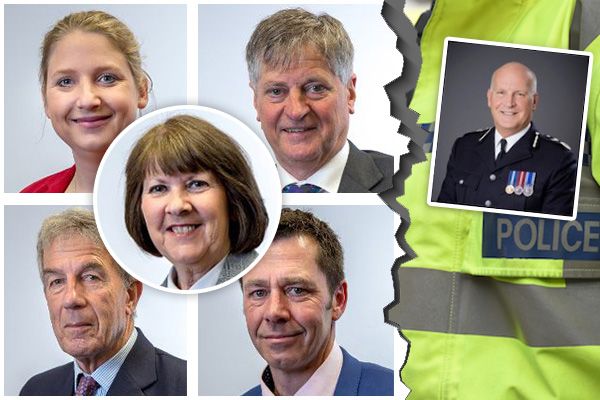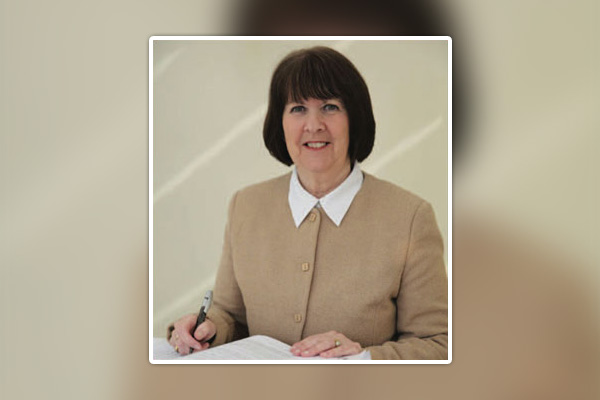

The outgoing Head of Law Enforcement has accused the committee responsible for the island's policing of repeated "operational interference".
Patrick Rice went public with these accusations just weeks before his retirement, at a Scrutiny hearing called to assess an inspectorate report into both Law Enforcement and Home Affairs.
Chief Officer Rice said he had, on multiple occasions, been "subtly directed" by members of the committee to take action on a number of matters.
Pictured: Patrick Rice, Head of Bailiwick Law Enforcement, in front of the scrutiny panel.
But his claims are not in line with what the inspector himself said. Matthew Parr from Her Majesty's Inspectorate for Constabularies said they did not find Home Affairs were guilty of "political interference", and only slightly operational interference. He also clarified any incidents which could be interpreted as such were all on a small scale, and never implied corruption. He said it was more the case that the committee tended to focus on small details rather than large scale strategy, but it was just a case of them having to find a better balance in future.
On the other hand, Chief Officer Rice said: "I don't think deputies should be getting involved in operational matters like these. I have had frustrations with my relationship with politicians, and I have never experienced this focus on low level issues before in my eight years working here."
Then, when asked if he ever considered having a frank conversation with the committee about the actions he considered to be operational interference, he said: "I would've thought that that discussion would not have been necessary. Looking at the experience Deputy Lowe has, I think it would have been unnecessary to have that conversation, but I did later engage with the Chief Secretary of Home Affairs (at that time) to discuss it."
He also said there had been certain actions taken which he felt "undermined his position of leadership". He talked the scrutiny panel through four examples.
The first was an email from Deputy Marc Leadbeater asking about the potential to carry out a road safety campaign on the topic of flashing bike lights. Those type of lights are not technically legal in Guernsey, despite being in the UK, and Deputy Leadbeater wanted to bring it to the attention of the police with the potential of speaking to local bicycle groups.

Flashing bike lights are not technically road legal in Guernsey, but Police would rather people had them than no lights, so chose not to enforce the law.
Chief Officer Rice said after having been asked about this idea, they took the position that it was counter productive to their overall strategy of encouraging road safety. Lights were better than no lights, he said, and Guernsey was simply behind the times in updating the law. But when not hearing anything, Deputy Leadbeater chased the idea and spoke to the Roads Policing Sergeant.
"There is a clear indication that if there is a campaign, there will be enforcement, so we chose not to pursue this," Mr Rice said.
"But I received a second email from a member of the committee directing me to comply with the request, and I wasn't prepared to do that. I considered that email to be directing me to target a section of the community."
Another example given was when a video of a bus driving on the wrong side of the road started trending on local social media. Chief Officer Rice said he received emails from two committee members, Deputy Mary Lowe, the committee President, and Deputy Victoria Oliver, saying they had been contacted by multiple members of the public querying if any investigation was taking place. Deputy Oliver asked the question of whether there were different standards for public drivers and bus drivers, as she was being asked by the people contacting her.
"I looked into it and we had not received a complaint, so were not looking into it. I don't think deputies should be getting involved in operational matters like that. The email said the deputy 'did not want the public to think bus drivers are getting special treatment'. That is an unnecessary intervention from the committee, and I thought it was an unnecessary email."
Pictured: the Home Affairs Committee in front of the panel.
Overall, the scrutiny panel questioned whether Chief Officer Rice really felt these incidents were matters of operational interference, and he said he did, but in subtle ways.
On the other hand, the inspector, Mr Parr, said the committee listening to its "constituents" and taking these matters to the police was a "laudable" part of their work, and only something they needed to balance with other work, rather than stop doing altogether.
It was Chief Officer Rice's overarching point that if committee members were going to continue to raise issues with enforcement, they should do it through the correct channels, such as speaking to the duty inspector. But Deputy Lowe said that Mr Rice saying that during the public hearing yesterday was the first time she had been told. The Home Committee as a whole questioned why the Head of Law Enforcement had not spoken to them about these concerns directly before.
"It is a shame he couldn't speak to us," Deputy Oliver said.

Deputy Mary Lowe said she is comfortable with how her committee have acted.
"I am quite comfortable with how the committee have acted," Deputy Lowe added, "we are accountable to the public at the end of the day, so we have to take that into account.
"Whatever I see on social media that is relevant I send across to staff in case they weren't aware, and they often thank us for it. The allegations of operational interference have never been brought to us before, and I wish we'd had our attention brought to it."
The third example of alleged interference was an incident during the resignation period of a senior member of staff in the police. When a High-Tech Forensics Officer was working his notice, Deputy Oliver contacted Chief Officer Rice to question whether it would be more cost effective to offer him a pay rise, rather than paying to train a replacement and spending money using Jersey police to cover in the interim. The man was the only one doing his job, so there was no one else to take up the role while a replacement was being found. Deputy Oliver said she did this in the knowledge States staff were often "poached by the private sector", so was hoping to save money.
But Mr Rice said he felt this was another case where political members were treading on his toes and trying to do his job for him.
Finally, the fourth example given was when the committee asked Mr Rice to meet with a man who was complaining about customs in Guernsey. Mr Rice said it should go through the formal complaints system, while the committee said the man had strong constructive criticism it would be good to hear. Mr Rice ended up refusing to meet with the man: "for me to have stayed there and taken that complaint would have undermined my position and given the wrong message to my staff. I want them to be able to go about their duties with confidence".
Chief Officer Rice will be retiring at the end of this year, and will be replaced by Officer Ruari Hardy in the new year. Previously, Mr Rice has not gone public with these concerns by his own admittance, because he did not want to openly criticise the committee. But he felt he had to answer truthfully when in front of the scrutiny panel on Wednesday.
While Home Affairs maintained all of the given examples were just it asking questions and trying to help, and in no way directing any operational matters, Deputy Richard Graham, a member of Home, said: "We can't deny we have got the interface between political and operational work wrong on some occasions, it is obviously not good if we have frustrated the police chief, we have to sit down and work that out.
"We don't always understand why the incidents have led to these conclusions [from Chief Officer Rice], but we can't deny those conclusions have been made, so we will address them."
Express will report more on what came out of the hearing in coming days.
Pictured top: Home Affairs (l) and Patrick Rice (r).
Comments
Comments on this story express the views of the commentator only, not Bailiwick Publishing. We are unable to guarantee the accuracy of any of those comments.